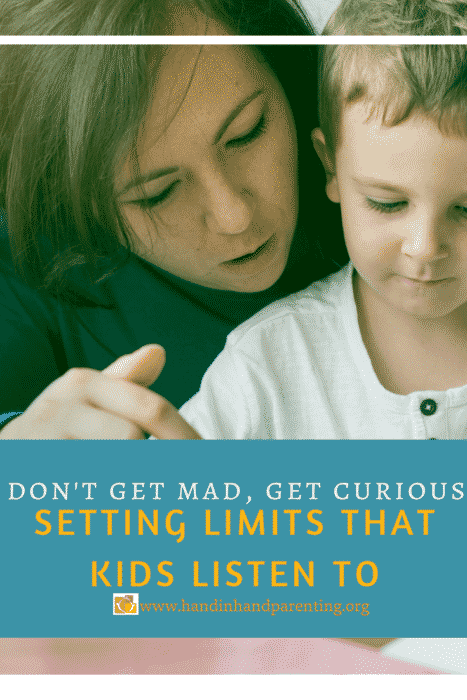A Guest Post by Yasmeen Almahdy
If you want to set limits that your children actually listen to, doing what your parents did will not help. That is, if they yelled, nagged, bribed or sent you to your room for not complying.
And if you remember how it felt when your parents issued those orders, you’ll know why, says Dr. Yasmeen Almahdy, an instructor with Hand in Hand Parenting.
In those times, we feel unheard, shut down, upset, and powerless.
Not prime motivators for co-operation.
Why Punishment Does Not Help Children Get Things Done
When parents set limits that children do not listen to, something else happens, says Dr. Almahdy. We get caught up in punishment.
And punishment doesn't actually help our kids get things done.
“Setting limits is not about punishment. It's not about sending your child away. It's not about yelling or shouting at your child. Setting limits means that you
stop the off-track behavior,” Dr. Almahdy says.
Why Won't My Child Listen?
There is more going on than just resistance when a child doesn't listen or outright defies your request to get something done.
This is why it pays to get curious, not mad when they say no.
If you get curious about the behavior, you’ll often find the real reason your children won’t stop fighting, refuse to do their homework, or keep bugging the dog.
These off-track behaviors are all signals that demand your attention – not to manipulate you or to get out of doing chores – but because a child has some bigger issue nagging at them, and would like you close.
Noticing the behavior and what it signals is a first step for parents to help.
Children can’t always articulate their issues or challenges well, and so their behavior alerts us to the fact that all is not well.
“I remember one time when I was overwhelmed in the kitchen I had guests at my home and I needed help from my teenage daughter so I called her to help,” says Dr. Almahdy. “Just like that, she said, “I'm not the only person here! Why is it always me? Why do I have to help?”
 Defiance Isn't Just “Bratty Behavior”
Defiance Isn't Just “Bratty Behavior”
If these sound the words of a bratty, entitled kid, they weren’t. Dr. Almahdy says she was surprised by her daughter’s reaction. That surprise led her to get curious, not angry.
“Before I was introduced to Hand in Hand Parenting, I would have yelled and
shouted at her and, you know, it would get very complicated afterward, but after I learned Hand in Hand’s tools I knew exactly what I should do that moment,” she says.
Why Setting Limits Without Yelling Actually Helps Kids Respond Better
She told her daughter that the words had been unacceptable, but also she could see that, in using them, her daughter was upset by something else.
Her daughter started crying and told her about an earlier quarrel with some friends.
She hadn't felt able to come to her mother with the problem, but when her mother asked her to perform the simple task in the kitchen it triggered a backlog of bad feelings.
And if Dr. Almahdy had yelled or sent her daughter away for speaking to her harshly, the problem would have remained hidden and unaddressed.
“The problem itself was obscured by the off-track behavior,” she explains.
While she did set a limit on the harsh language her daughter had used, she remained warm and was curious why her daughter reacted the way she did. And it became a learning opportunity.
She was able to support her daughter through the tough time she was having with her friends.
Don't Get Mad, Get Curious And Set Limits That Kids Listen To
It doesn’t always seem the obvious choice to set limits with warmth, especially when this is rarely the way we were brought up, but in doing so, you look to the good in your child. You look beneath the offtrack behavior and to the issues driving the behavior.
When you get curious instead of getting mad, you don’t get stuck issuing punishments or bribing, but you do get to be the support your child needs.
The best bit? When kids' true feelings are heard, they return to their sunnier – and more cooperative – selves. And that means less “no” and more “I guess so…”
Get this free guide to Setting Limits here.
Read: How is it Possible to Parent Without Punishment?
Get Help Parenting Tweens: Get practical solutions and strategy for parenting your tween child in the online instant-access class Raising Happier Tweens, Staying Close and Enjoying Your Connection.
How To Be a Peaceful Parent
Discover one other tool you need to set limits well. Dr. Yasmeen Almahdy shares how she supports herself in parenting peacefully in the second half of this video.
